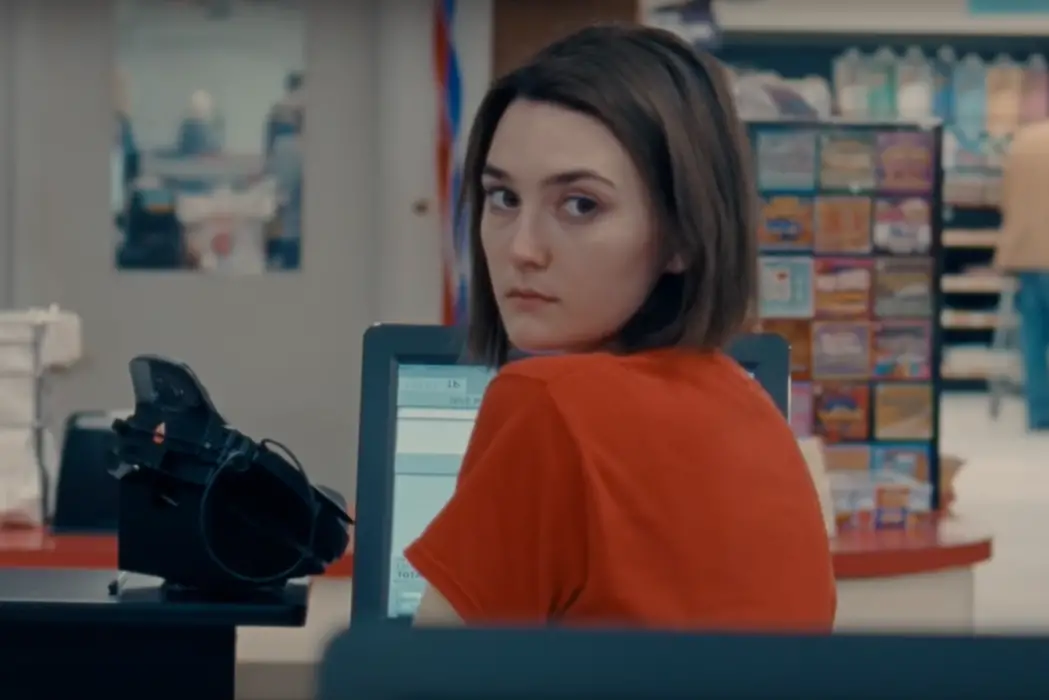NEVER RARELY SOMETIMES ALWAYS: More Than Just An “Abortion Movie”

Alexia (also known as Lexi) spends an alarming amount of…
It’s a shame that one of the best movies of 2020 was unable to receive the proper theatrical release that it deserves. But it’s an even bigger shame that viewers will inevitably refer to this film as an “abortion movie.”
To call Eliza Hittman ‘s Never Rarely Sometimes Always an “abortion movie” is immensely reductive. It is also a disservice to Hittman , who meticulously and artfully crafted a film that is much more than that. Never Rarely Sometimes Always is also a character study, a coming-of-age story, a road movie, and a tale about female friendship.
Silence Speaks Volumes
Newcomer Sidney Flanigan stars as Autumn, a 17-year-old dealing with an unplanned pregnancy. Accompanied by her cousin Skylar ( Talia Ryder ), she embarks on a quest to New York City so that she can get an abortion without parental consent. The minimalist plot is straightforward, but that doesn’t make the film rudimentary or bland.

Autumn doesn’t even need to admit she’s pregnant, Skylar just innately understands after witnessing her cousin vomit at the supermarket where they both work. Likewise, Hittman doesn’t need to explain everything to her audience, because the film is entwined with these quiet, intimate moments that say more than words ever could. Every subtle glance or gesture is teeming with symbolism.
One example of this appears early on in the film when Autumn first learns she is pregnant. Almost immediately, she retaliates by piercing her nose. The scene features no dialogue, just intense close-ups, and Flanigan ‘s robust performance. That’s all it takes to make Autumn’s motive clear: this isn’t an impetuous act of rebellion, this is a teenage girl reclaiming her body.
Never Rarely Sometimes Always marks the feature film debut for both Flanigan and Ryder, but both actresses knock it out of the park. So much of the film hinges tremendously on their facial expressions, which convey a dynamic range of internalized emotions. Right from the beginning, it’s easy to identify with Autumn as she fights back tears while singing in her high school talent show after a classmate shouts “slut” at her. Viewers can genuinely feel how exhausting and emotionally draining the tumultuous journey is for the two girls, and it all culminates in a devastating scene when Autumn finally unleashes the emotions she’s been bottling up.
Authenticity and Autonomy
In Never Rarely Sometimes Always, men are a constant threat looming in the background, whether it’s a stranger masturbating on the subway or a “nice guy” who’s willing to help the girls out as long as he gets something in return. Hittman doesn’t make these men out to be villains, and she doesn’t have the girls cower in fear in response. She depicts these moments with astounding authenticity, shedding light on just how commonplace this type of predatory behavior is. Unfortunately, for many women and girls, these are everyday occurrences that are all too familiar.

When it comes to portrayals of predatory behavior, many directors are quick to focus on the men in those situations. This is where Hittman ‘s powerful directing truly shines, as she refuses to give the men more attention than they deserve. When Autumn and Skylar close up at the grocery store, they count the money and hand it to their manager in the next room. We never see their manager, but we hear him plant kisses on their hands in the process. We don’t need to see him perform this action, the sound is enough to revolt us. Hittman proves she knows exactly how and when to leave things to the viewers’ imagination.
Hittman also excels at flipping the male gaze on its head. Throughout the film, the focus is mainly on the girls’ faces. But when Jasper ( Théodore Pellerin ) checks out Skylar, the view shifts to the male gaze. This is just one of many ways that Hittman makes the most out of the medium. Although her screenplay may be sparse, she effectively says plenty by way of Hélène Louvart ‘s striking cinematography, a strong use of sound, Scott Cummings’ solid editing, and Julia Holter’s haunting score.
More Personal Than Political
Never Rarely Sometimes Always offers a welcomed and necessary perspective on the topic of abortion. The film is essentially Hittman ‘s answer to Cristian Mungiu ‘s gritty drama, 4 Months, 3 Weeks and 2 Days. The girls in Never Rarely Sometimes Always definitely endure their fair share of obstacles, but there is much more realism in Hittman ‘s film compared to Mungiu ‘s.
While similar films tend to fixate on the broader social implications of abortion, Never Rarely Sometimes Always is much more personal. Despite the political nature of the subject, Hittman refrains from being overly political or preachy. She tackles the themes of abortion and misogyny with grace and sensitivity, encouraging her audience to view these characters through an empathetic lens rather than a judgmental one. Of all the movies that delve into this topic, this is the one that young women should be watching. Fortunately, the film is rated PG-13, making it more accessible to the people who need to see it the most.
Never Rarely Sometimes Always : Conclusion
Eliza Hittman’s award-winning indie drama is an understated and fragile film, but it’s also a powerful one. Never Rarely Sometimes Always is thoughtfully directed, and elevated by Sidney Flanigan and Talia Ryder ‘s poignant performances. Don’t let the label “abortion movie” deter you from seeing one of the year’s best films.
Have you watched Never Rarely Sometimes Always? Let us know what you think of it in the comments below.
Never Rarely Sometimes Always is now available to rent on Prime Video, Youtube, iTunes, Microsoft, Vudu, Google Play, and FandangoNOW.
Does content like this matter to you?
Become a Member and support film journalism. Unlock access to all of Film Inquiry`s great articles. Join a community of like-minded readers who are passionate about cinema - get access to our private members Network, give back to independent filmmakers, and more.
Alexia (also known as Lexi) spends an alarming amount of time at the movies. When she's not working or writing, she's probably at the movies. When she's not at the movies, she's probably at home watching movies with her dog. Follow her on Letterboxd here: https://letterboxd.com/lexiamoriello













